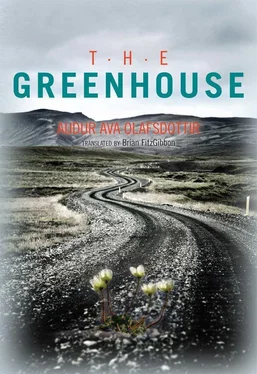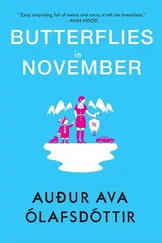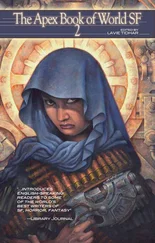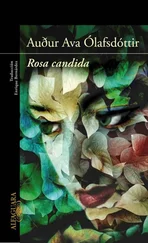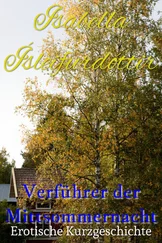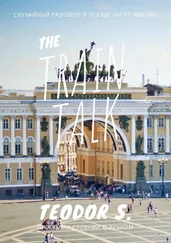— By the most beautiful plants in the world, I mostly mean roses, I say to the child.
Anna looks up from the book and observes me for a short moment as if she were trying to solve a riddle. Flóra Sól and I take notes. I mark the most important information with a cross and then put down my pencil. My daughter stretches out for the pencil and also draws a clear cross on the same page. My child’s mother looks up from her research; something has attracted her attention.
— There’s no question about it, she’s left-handed like you, she says.
The geneticist points at the child, who is holding the pencil in her left hand like her father. Her interest in her daughter and me seems to have suddenly increased. Since it so happens that I have the book open to a page about the hybridization of roses and cross-fertilization in nature, I wonder if I should mention plant genetics or plant biotechnology; it could be a way of fusing our fields of interest, the DNA of plants. Instead I ask what she’s engrossed in.
— What about you, what are you reading? I ask, and my daughter also looks up. We both look over the table at Anna with interest. She gives a brief summary of the research material, as if she only had a limited interest in the subject. In fact, you could say that she summarizes the whole thing in just one phrase:
— Deoxyribonucleic acid, she says and smiles at us.
— De-o, says the child quite clearly, standing up in my arms.
— Yeah, we’ll go to the church later, I say to my daughter.
— Why do you say that? Anna asks, giving us both a bewildered look in turn.
— It’s Latin for god I explain. Our daughter doesn’t only speak her mother tongue, I add in a lighter tone, she’s a nine-and-a-half-month-old girl and she already speaks two languages.
We both laugh. I’m relieved.
— Are you teaching the child Latin?
I tell Anna that we go to the church to look at an old painting of a baby Jesus that looks like our daughter.
— Apart from that there actually isn’t an awful lot that we can do around here.
My daughter is tuned in and wants to show her mother more things she’s learned in the church, and lifts up three fingers like the child in the painting. She’s wearing a light blue elbow-sleeve blouse, with dimples on her elbows. Then she draws a clear cross in the air. I give Anna a sideways glance; I don’t know how she’s taking this pantomime. We’ve occasionally stumbled into some of Father Thomas’s masses, and the child has recently started to mimic the priest’s gestures and repeatedly makes the sign of the cross.
— What’s she doing? Anna asks.
— She’s expressing herself with her body, I say. She mimics what she sees.
Anna laughs and I feel relieved. She doesn’t look as worried as she sometimes has before. Our daughter laughs as well. The three of us laugh, the whole family.
— Good boy, Anna then says.
I find women a bit unpredictable. Somehow I thought it was only Mom who said things like that.

I’m making great progress every time I use the gas cooker, although I’m still quite slow at cooking. In a short time I’ve managed to learn seven dishes: I can fry meat, both in slices and pieces, make two kinds of sauces, boil potatoes and various types of vegetables, boil rice, make meatballs, and, more recently, fry vegetables instead of boiling them. Then I can make various kinds of porridge for the child and have once tried to make rice pudding with cinnamon, which wasn’t bad. I have to admit that it matters to me that Anna admires my genuine efforts to cook for her and her daughter.
I don’t try anything complicated, mind you, like a whole bird or anything like that; Mom wasn’t really into poultry. I’ve also popped in to see the woman in the restaurant a few times when I’ve forgotten myself in the garden and taken some of her cooked food home with me. I watch Anna when she’s eating the woman’s food, and I admit that it gives me satisfaction to hear that she doesn’t praise it as much as mine.
The moment has come for me to attempt cooking fish. I go to the market with my daughter in the morning and try to choose something that bears some resemblance to the fish I’m familiar with back home, anything that more or less looks like haddock. There are several very small fish that I imagine might be from lakes and not the sea. You can’t buy fish fillets either, just whole fish, complete with head, tail, bones, and all its innards. Despite all my experience of braving the elements at sea, I’ve honestly no experience of turning fish into those fillets in breadcrumbs you can just throw straight into the pan. But I soon give up trying to do it the way Mom used to; some of the ingredients just can’t be found in this village, even though I’ve searched for them in all the shops, breadcrumbs, for example.
— What were you like as a child?
The question surprises me. Anna is constantly surprising me. We’re finishing eating the small fish, which I ended up frying whole, and the mother and daughter sit opposite me at the table, waiting for my answer. Even though she might be wondering about me in relation to Flóra Sól, Anna’s interest, nevertheless, seems to be genuine. Would I be on the right track if I told her I was redheaded and shied away from the sun, that I preferred a damp potato shed or shaded flower bed to being out in the sun? I was incredibly freckled as a child; my face was actually just the sum of its freckles. Dad has, of course, shown Anna the photograph collection, so the description shouldn’t surprise her.
— I was short for my age, and when I was fourteen I was the smallest in my class, I say. Then I shot up one summer and was a head taller than everyone else my age when I was sixteen.
— So you changed into a fully grown man over one summer?
— Man might be a bit of an overstatement, overgrown teenager might be more like it. What about you, when did you become a woman? Or isn’t that the kind of question a man asks a woman?
— It took a few summers, it happened gradually and effortlessly, without anyone ever really noticing it. I was one of the lucky ones.
Then she asks me if I’ve always been interested in plants.
— Yeah, pretty much from when I was a kid. Not exactly in the plants as such, not at first, it was more about being in the garden with Mom. My interest in the plants themselves came later. I started with a little flower bed south of the greenhouse, where I planted carrots and radishes and placed labels on them. I was seven years old and could see Mom through the glass clipping roses. Mom also experimented with all kinds of imported seeds and bulbs; the main thing that grew in my private flower bed, though, was weeds. I also used to read a fair bit as a child, lay out in the garden in the summer and sat in the greenhouse in the winter and read foreign books about children who had huts on tops of trees. I also went into the greenhouse later to study for my exams in the humidity, light, and heat. Even when there was snow, frost, and darkness outside, I’d run out into the greenhouse in my T-shirt with my books and trudge through the snow, knee-deep, with a pencil clenched between my teeth.
— Were you never teased about your hobby?
I ponder on how much I should tell Anna, what memories I should dig up from my past; one shouldn’t reveal everything one’s done.
— There was only one bad episode; I was ten years old and it was probably because of the color of my hair. They had been stalking me for several days, and I crunched mud with pebbles between my teeth while they rolled me over in the gravel and beat me up. I didn’t feel bad after it, even though there was a taste of blood in my mouth and sand in my back teeth. One of them was forced to phone me that evening to apologize. Then he hung up without saying good-bye. I answered and the call was so short that Mom thought it was a wrong number.
Читать дальше
